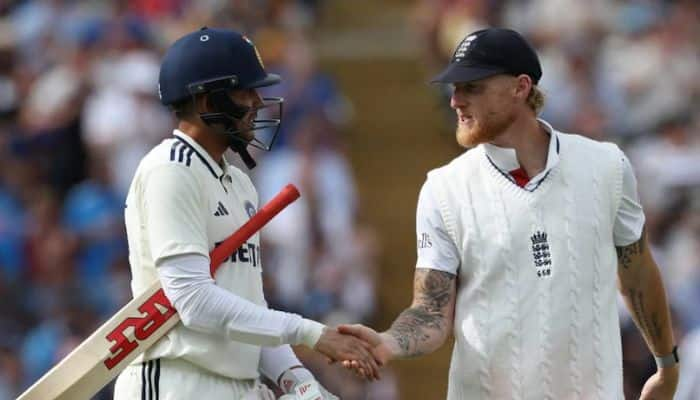In a Test match packed with twists, tension, and tactical turns, India pulled off a memorable draw in the fourth Test against England at Old Trafford, keeping the Anderson-Tendulkar Trophy alive. While the scoreboard shows a stalemate, the emotional and psychological victory clearly belonged to India. Heroic batting from KL Rahul, Shubman Gill, Ravindra Jadeja, and Washington Sundar saw India survive over five sessions, losing just four wickets on a deteriorating pitch, showcasing immense grit and game awareness.
But beyond the scoreboard and statistics, the draw sparked a fresh controversy. Former India captain Sunil Gavaskar launched a fiery critique of England’s tactics — in particular, Ben Stokes’ decision to bat India out of the game with an enormous first-innings lead of 311 runs, instead of declaring earlier to chase a win.
“Why Did You Take a Lead of 311?”: Gavaskar Calls Out England’s Double Standards
Sunil Gavaskar, known for his sharp analysis and fearless commentary, did not mince words as he questioned the logic behind England’s prolonged batting. While England had both momentum and time on their side, they chose to bat India into submission. Centuries from Ben Stokes and Joe Root powered England to 669, a mammoth total that many feel came at the cost of potential victory.
Reflecting on the hosts’ decision, Gavaskar pointed to their previous comments about India’s declaration tactics in Birmingham. “Some England players said India were scared when they set a 600-run target. But this time, England did the same — and still couldn’t win,” Gavaskar said on Sony Sports Network. “That’s not bravery. That’s bravado and loud talk.”
India’s Second Innings: Defiance, Discipline, and a Statement
Facing a 311-run deficit, India’s batters knew their backs were against the wall. But rather than collapse under pressure, they responded with poise and patience. KL Rahul and Shubman Gill blunted England’s attack early on, setting the tone for a resilient batting performance. The final-day masterclass came from Ravindra Jadeja and Washington Sundar, both inching towards memorable centuries before the match was declared a draw.
Their performance was not just about batting time; it was a clear message — that India, even when cornered, will fight back. For Gavaskar, this spirit was worth celebrating: “Only four wickets lost in more than five sessions — no matter the pitch — that’s extraordinary temperament under pressure.”
Gavaskar’s Challenge to Shubman Gill: Speak Up, Ask the Tough Questions
Perhaps the most headline-grabbing part of Gavaskar’s commentary was his challenge to young India captain Shubman Gill. Speaking candidly, the legendary opener said he would’ve liked Gill to confront Stokes at the post-match press conference.
“Shubman should’ve asked, ‘Why did you take a lead of 311? Why not declare after 240 or 250?’” Gavaskar said. “After scoring his hundred, why didn’t Ben Stokes give his bowlers more time? I know Gill is a nice guy. But someone has to ask.”
While Gill didn’t attend the press conference, Gavaskar’s sentiment struck a chord with many fans who believe England’s decision-making lacked the aggressive clarity they so often preach under their “Bazball” philosophy.
England’s Strategy Backfires: From Dominance to Disappointment
England may have had the upper hand for most of the match, but their tactical conservatism ultimately denied them a golden chance to clinch the series. By choosing to pile on the runs instead of pressing for a result, they allowed India an opening — and India took it with both hands.
The result sets up a mouthwatering series finale at The Oval, with India aiming to level the series 2-2. With tempers flaring and narratives shifting, all eyes will be on how both teams respond — especially Shubman Gill and Ben Stokes.

